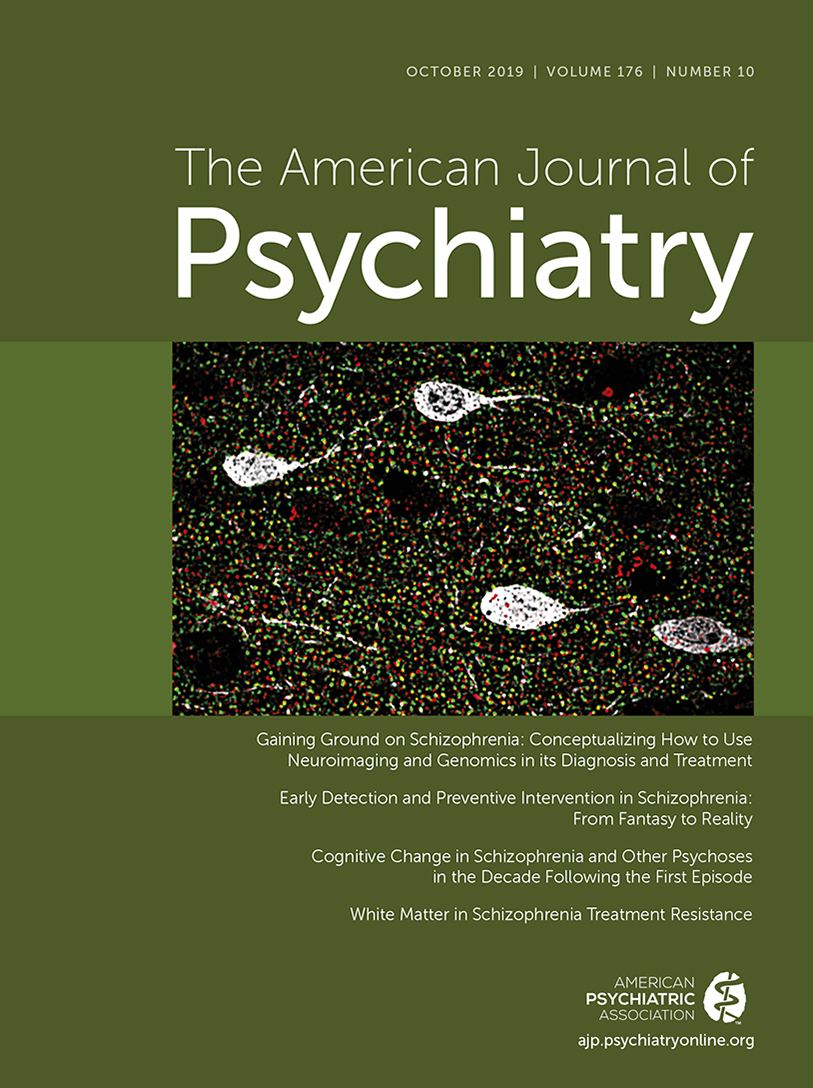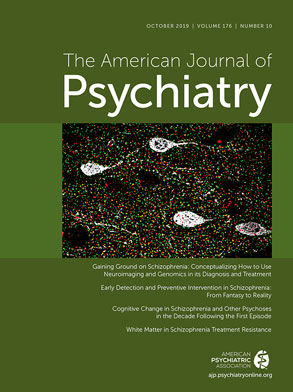Cognitive dysfunction is a core and defining characteristic of schizophrenia (
1). Countless cross-sectional studies, including in large population-based samples, have shown that IQ is lower in patients with schizophrenia, and lower than would be expected on the basis of the educational attainment of their mothers (
2) and close relatives (
3). The intellectual underperformance precedes the onset of psychosis by a decade (e.g.,
4), with more recent longitudinal birth cohort data showing that the decline in IQ is progressive and starts in adolescence (
5) if not earlier (
6). Surprisingly, despite much more data being available, what happens
after illness onset is less clear. Cross-sectional data provide a hint: IQ in schizophrenia patients is two standard deviations lower than that of healthy subjects in samples where IQ is assessed (many years) after illness onset, whereas it is only 0.5 standard deviations lower prior to diagnosis (
7). Thus, one would expect IQ to continue to decline after psychosis onset. However, despite this large disparity in IQ deficits before and after psychosis onset, the cross-sectional data have not been confirmed in longitudinal studies (follow-up studies are needed in view of the confounders inherent to cross-sectional designs, such as cohort effects). This is not due to lack of trying: dozens of such studies have been done.
The problem, as Zanelli et al. (
8) convincingly argue in an article in this issue, is that the study designs so far have been flawed. The most notable failing is that many of these studies have neglected to include a healthy control group, making it impossible to control for the effects of age and repeated testing (the authors provide an informative table in the
online supplement, listing all longitudinal studies that tested cognition in first-episode psychosis patients; only 16 of 39 studies included a healthy control group). Second, follow-up periods were invariably short (usually 5 years or shorter), reducing power when, as expected, the IQ changes per year are small. Finally, the specificity of cognitive change has not been addressed. This issue is as relevant today as it was when “dementia praecox” was contrasted with “manic depressive illness” on the basis of (cognitive) outcome (
9). Inconceivable as it sounds, it took more than 125 years after the original description by Kraepelin for the first study to appear that properly examined the cognitive trajectory after psychosis onset (
8).
Using a population-based cohort from the United Kingdom, Zanelli et al. (
8) tested cognitive function in 106 patients who were being seen for a first psychosis, followed them for an average of 9 years, and compared cognitive trajectories with a similar number of healthy control subjects. Full-scale IQ was estimated on the basis of four WAIS subtests, which has been shown to be a reliable approximation of total IQ. In addition, specific cognitive functions were tested, examining more detailed domains of cognition. The authors’ results show that (normalized) IQ declined in the schizophrenia group (N=65) but not in the patients with other psychoses (N=41), although the effect size was moderate (d=−0.28). In an elegant subanalysis, the authors examined whether, in the healthy comparison subjects with an IQ below 90, cognitive change was larger than in those with an average or higher IQ in order to test whether the excessive IQ decline in the schizophrenia patients could be due to lower cognitive reserve. Interestingly, IQ decline was independent of baseline IQ, suggesting that the excessive IQ decline in schizophrenia is an illness-related phenomenon. The additional finding that IQ decline was larger in the more severely ill patients bolsters this conclusion. For the more specific cognitive tests, patients with schizophrenia showed significant declines in memory functions such as verbal learning and immediate and delayed recall and in verbal knowledge (vocabulary), while the patients with other psychoses showed a decline in verbal learning only. Overall, the decline on the more specific cognitive tests was largest in the schizophrenia group. Medication history (type of antipsychotic, duration of treatment) did not affect the cognitive decline, either in a positive or negative fashion.
In addition to establishing that IQ declines in schizophrenia after psychosis onset, of equal interest is the authors’ finding that the IQ decline was absent in the patients with psychotic disorders other than schizophrenia. Interestingly, the authors underemphasize this result, in fact suggesting the opposite, that is, that the findings do not support the “specificity hypothesis.” However, they base this conclusion on the finding that in some of the specific cognitive tests, both patients with schizophrenia and those with other psychoses showed declines, although the declines were larger across the board in the former. However, the specificity regards a far more important and global measure: IQ. In that respect, the data are both clear
and specific: only the schizophrenia patients showed a decline in IQ, thus ruling out the possibility that this is related to psychosis per se. It is unfortunate that the authors to not report how many of the 40-odd “other psychosis” patients were diagnosed with bipolar illness, since then their study could have addressed whether differences in IQ decline were found between the two disorders. If so, their findings would have been consistent with a growing body of evidence that schizophrenia and bipolar illness are more dissimilar than is suggested by the (limited) genetic overlap between them (
10). Indeed, the differential IQ decline in schizophrenia
after illness onset is in line with a recent report (
6) finding that IQ decline in childhood and adolescence is found
before illness onset in individuals who go on to develop schizophrenia but not in those who are later diagnosed with affective and other psychoses. The findings are equally consistent with the specificity of brain changes in schizophrenia patients (
11) and their offspring (
12), as well as abnormalities seen in motor development in individuals who later develop schizophrenia but not in those who go on to develop other psychoses (
13). Although genetic overlap is found between schizophrenia, bipolar illness, and intelligence, the direction of this relationship in schizophrenia is the mirror image from that in bipolar illness; in schizophrenia risk genes are related to lower intelligence, and in bipolar illness to higher IQ (
14).
What does the general cognitive decline after illness onset signify? First, it should be noted that although the patients were seen during their first psychosis, the average age at study inclusion was almost 30 years, which is quite high for a first psychosis. Rather than these patients being in the early stages of their illness, their psychotic symptoms may have been ongoing for quite a few years. Moreover, cognitive decline precedes the onset of the first psychosis by more than a decade (
4–
6), suggesting that the IQ decline in the Zanelli et al. study may be a continuation of a process that has been under way for decades. However, this does not preclude an additional process taking place after the onset of psychosis. Indeed, the excessive decline in IQ in schizophrenia has been related to progressive loss of cortical gray matter volume after illness onset (
15). This loss could be related to a general accelerated aging of the brain (
16), although the specificity in some of the cognitive domains reported by Zanelli et al., such as verbal knowledge and memory, argues against this.
Although the cognitive decline was related to severity of symptoms at baseline, but not to change in severity over time, the report does not specify whether it was related to number of hospitalizations and psychotic relapses; it would be important if these data could still be made available. Finally, the authors’ finding that of the more specific cognitive domains, verbal functions and memory were particularly affected in schizophrenia is consistent with the large body of literature reporting hippocampal involvement in schizophrenia (
17) but not in bipolar illness (
18).
Despite a relatively small sample, the Zanelli et al. study is the first to convincingly suggest that the cognitive decline that begins years or even decades before the onset of the first psychosis continues for many years afterward, is specific to schizophrenia, and is relatively unaffected by antipsychotic medication. These findings should serve as a clarion call to study the causes of this cognitive decline, since once we understand the cognitive decline in schizophrenia, we will understand schizophrenia itself.

